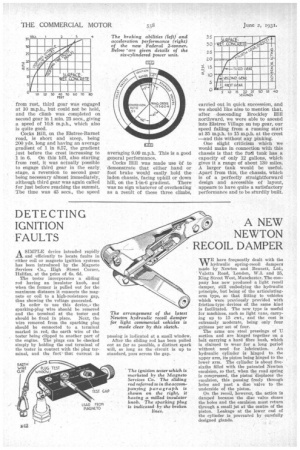A NEW
Page 60

If you've noticed an error in this article please click here to report it so we can fix it.
• NEWTON RECOIL DAMPER
WE have frequently dealt with the hydraulic spring-recoil dampers made by Newton and Bennett, Ltd., Valetta Road, London, W.3. and 35, King Street West, Manchester. The company has now produced a light recoil damper, still embodying the hydraulic principle, but being of the articulatingarm type, so that fitting to vehicles which were previously provided with friction-type devices of the same kind is facilitated. The new type is useful for machines, such as light vans, carrying up to 15 ewt., and the cost is extremely moderate, being only four guineas per set of four.
The arms are steel pressings of U section and are hinged together on a bolt cailying a hard fibre bush, which is claimed to wear for a long period without need for lubrication. An hydraulic cylinder is hinged to. the upper arm, its piston being hinged to the lower arm. The cylinder is about five. sixths filled with the patented Newton emulsion, so that, when the road spring is compressed, the piston displaces the emulsion, this passing freely through holes and past a disc valve to the underside of the piston.
On the recoil, however, the action is damped because the disc valve closes the holes and the emulsion must return through a small jet at the centre of the piston. Leakage at the lower end of the cylinder is, prevented by carefully designed glands.




































































































